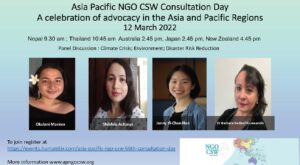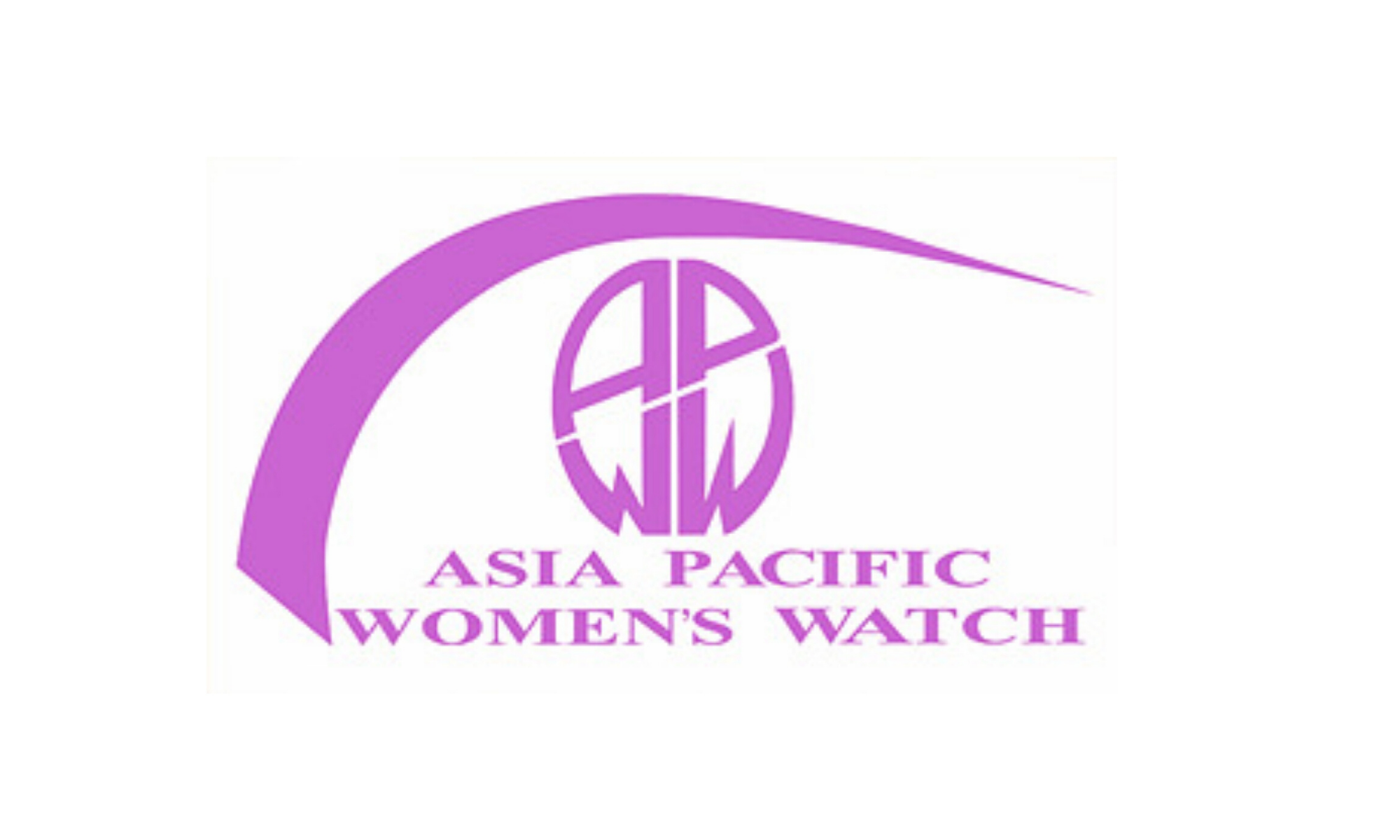
Dear CSW followers,
We made it. Well done to everyone for surviving a second online / hybrid CSW. For many this was a long haul of working through the day, following the negotiations at night and working with their governments to hold them accountable to push a progressive agenda. It’s been a joy working with you all and I hope you’re recovering rapidly from the sleep deprivation.
Parallel Sessions

The Beyond Beijing Committee (Nepal) and APWW successfully presented ‘Achieving Gender Equality and Empowerment of Women and Girls int he context of Climate change’ on Friday March 18th 2022. Moderated by APWW SC Member Ms Shanta Laxmi Shrestha, speakers covered a range of topics from food security, sexual and reproductive rights and addressing the challenges of climate change (interpretation was available in Nepali)
 APWW also successfully co-hosted the NGO CSW Asia Pacific Forum Day event held on Saturday 14th March, 2022. This event featured a celebration of women activists from the Asia Pacific Regain along with an interactive panel on the impacts and solutions to some of the issues arising from climate change in this region . A link to the recording of this event can be found here.
APWW also successfully co-hosted the NGO CSW Asia Pacific Forum Day event held on Saturday 14th March, 2022. This event featured a celebration of women activists from the Asia Pacific Regain along with an interactive panel on the impacts and solutions to some of the issues arising from climate change in this region . A link to the recording of this event can be found here.
A commentary on the Agreed Conclusions
Negotiations for the Agreed Conclusions once more came down to the wire. It sounds like the most difficult negotiations revolved around the climate action paragraphs; negotiations on these paragraphs apparently occurred last, after delegates had already worked through the night, and so were apparently fairly short and to the point. The full version of the final Agreed Conclusions can be found here.
Despite the facilitator’s preference for a brief document, the Agreed Conclusions are about the same length as usual, although there is slightly more content in the preambular paragraphs than in previous years.
Here are some initial thoughts about the outcomes:
- The language regarding climate change mitigation and response is weak. It certainly doesn’t go beyond COP26 and in some places doesn’t even reach that standard.
- Language on the women, peace and security agenda made it in, but isn’t as strong as we would have liked. The connection between conflict, disaster response and gender was not clarified and the direct reference to Security Council resolution 1325 was deleted.
- On the plus side, multiple references to the Sendai Framework for Disaster Risk Reduction in the PPs. (See paras 6, 13, 27 in the PPs and 64(c) and (d) in the OPs.) were included.
- Reference to sexual and reproductive health and rights is included in the PPs, a gain, because the PPs set out the acknowledged and accepted context for the subject area. The language in the OPs regarding access to sexual and reproductive health and reproductive rights (para 62(ii)) has reverted to the CSW65 language, which is not as progressive as it could have been.
- Unfortunately language about sexuality rights was not accepted.
- The language on comprehensive sexuality education was watered down significantly, eventually reverting to CSW65 language. (para 62(ff))
- There is a new paragraph specifically on the need to protect women journalists and media professionals from interference, violence and harassment. (Para 62(rr).) There are also several other references to journalists and media workers as important partners and stakeholders. . (Paras 35 and 62(oo).) This is all new and welcome language, and was useful to win here, as it will set a standard for discussing trolling and online harassment against women in public roles under next year’s theme.
- There are good reference to oceans and water, which will be important in Small Island Developing States (SIDs countries).
- There was push back on the rights of women to own land , key advocacy pushed back on this and the result is a reference to the right to ownership of and control over land and other natural resources in the PPs (para 57), and two reference to eliminate discrimination in relation to ownership of and control over land and other forms of property in the OPs (paras 62 (f) and (h)).
- There has been a very obvious battle over including language about women human rights defenders – only two references have survived, down from six in rev.2. (paras 35 and 62(qq).) Language about women environmental defenders has been completely removed.
- The United Nations Declaration on the Rights of Indigenous Peoples was included in the PPs and there is also a solid reference to ‘respecting and protecting the traditional and ancestral knowledge, including of indigenous peoples’. (Para 32) and a good stand alone paragraph about Indigenous women in the OPs (para 62(dd) ), along with 10 or so references throughout the text.
- The OP paragraph on women and girls with disability includes a reference to the need for disability-inclusive design (para 62(q) ) and there is a reference to integrating a disability-inclusive perspective in policy and laws (para 62(h) ).
- There is strong language on women and girls in rural areas throughout the document.
- We are apparently only allowed to have three references to multiple and intersecting discrimination in the ACs (paras 19, 25 and 62(dd) ). Down from 5 references in CSW63 and seven in rev.2. (yep – it gets this petty.)
- There are strong paras on data and research (paras 56, 62 (ss) and (tt).)
It would be great to hear your thoughts / analysis as you develop your thoughts and workplans with the Agreed Conclusions.
